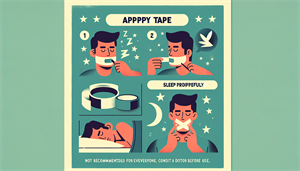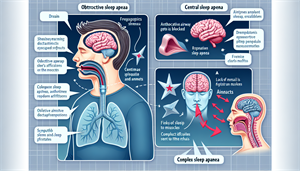
Does Mouth Tape Really Help Stop Snoring?
For those desperate to find a solution to their snoring problem, the question often arises: does mouth tape stop snoring? This article aims to provide a comprehensive exploration of this topic, backed by scientific evidence. We will discuss the potential benefits and limitations of mouth tape in the fight against snoring, and also compare it with other snoring solutions.
Understanding Mouth Taping
Mouth taping is a practice designed to promote nasal breathing during sleep. This can potentially reduce snoring and improve symptoms of mild obstructive sleep apnea. Other benefits may include less fatigue and improved sleep quality. However, while some scientific studies suggest that mouth taping can be effective for snorers who predominantly breathe through their mouths, sleep medicine experts have not yet reached a consensus on recommending it as a standard treatment for snoring or sleep apnea.
Alternative Anti-Snoring Devices
Before trying mouth taping, it's worth considering other anti-snoring devices such as mouthpieces, nasal strips, and chin straps. Lifestyle changes may also offer more reliable solutions. If you do decide to try mouth taping, it should be done with caution and proper materials.
The Snore-Stopping Potential of Mouth Taping
If the idea of taping your mouth shut at night seems strange, you're not alone. However, some individuals swear by this technique in their quest for a snore-free sleep. Mouth taping involves applying a piece of porous tape over both the upper and lower lips, keeping the mouth shut, and encouraging nose breathing. This technique is based on complex physiological principles and can help prevent mouth breathing and snoring. Advocates of mouth taping also claim it can improve fatigue, concentration issues, sleep quality, dry mouth, and asthma.
The Theory Behind Mouth Taping and Nasal Breathing
Mouth taping is based on the physiological aspects of breathing. Breathing through the nose enhances nasal airway resistance and decreases congestion or obstruction, which encourages nose breathing and reduces snoring. Mouth taping amplifies this process by acting as a physical barrier that keeps the mouth shut, discouraging mouth breathing and promoting nasal breathing instead. Studies have shown that mouth taping during sleep can improve snoring and reduce the severity of sleep apnea in individuals who predominantly breathe through their mouth and have mild obstructive sleep apnea.
Can Mouth Taping Keep Your Mouths Closed All Night Long?
While mouth taping seems to have its merits, it's not a guaranteed solution for everyone. Research has indicated that mouth taping can indeed improve snoring and reduce the severity of sleep apnea in mouth-breathers with mild OSA. However, it's important to use a safe and porous tape instead of duct tape, which can cause discomfort and potentially harm. Furthermore, while mouth taping might help with snoring in certain situations, there’s limited evidence to support its effectiveness in maintaining uninterrupted sleep throughout the night. It can also potentially have adverse effects on breathing, including a dry or scratchy throat, bad breath, snoring, allergic reactions, skin irritation or rash, and exacerbated breathing problems.


